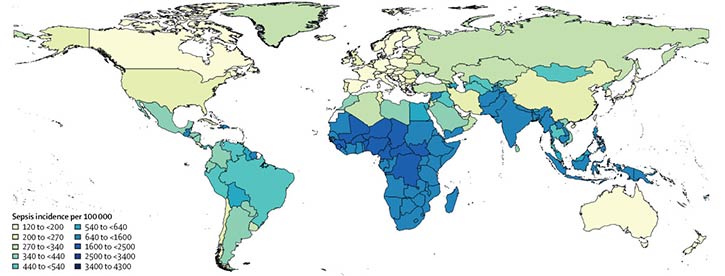Global sepsis burden is double previous estimates
January / February 2020 | Volume 19, Number 1
Sepsis, a life-threatening organ dysfunction due to infection, occurs in nearly 50 million people each year and causes about 11 million deaths worldwide. The toll is double previous estimates, according to a
recent article in
The Lancet, based on data from the 2017
Global Burden of Disease study.
Diarrheal disease was the most common underlying cause of sepsis, among all ages, genders and locations. Road traffic injuries and maternal disorders were the most frequent noncommunicable diseases complicated by sepsis. Sub-Saharan Africa was the region with the highest sepsis mortality rate.
Research and policy interventions targeting antimicrobial resistance, a key driver of sepsis, are “imperative,” the authors noted.
World Map of Sepsis Incidence by Location
 Sources:
Figure 3 (map) and
Supplementary appendix (data), Global, regional, and national sepsis incidence and mortality, 1990–2017: analysis for the Global Burden of Disease Study,
The Lancet, January 18-24, 2020
Sources:
Figure 3 (map) and
Supplementary appendix (data), Global, regional, and national sepsis incidence and mortality, 1990–2017: analysis for the Global Burden of Disease Study,
The Lancet, January 18-24, 2020
More Information
To view Adobe PDF files,
download current, free accessible plug-ins from Adobe's website.